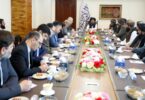KABUL (TOLOnews): US Secretary of State Antony Blinken spoke with Abdullah Abdullah, head of the High Council for National Reconciliation, in which he said US supports durable political settlement and permanent and comprehensive ceasefire in Afghanistan.
The US Department of State said in a statement that Blinken and Abdullah discussed the United States’ review of its strategy in Afghanistan.
“The Secretary thanked Abdullah for his vital work in support of the Afghanistan peace process, and he expressed America’s resolve to support a just and durable political settlement and permanent and comprehensive ceasefire in Afghanistan,” it said.
Abdullah’s office said that Afghanistan’s situation and the peace process were discussed in this conversation.
“Blinken reiterated US’s continued support for expediting the efforts for achieving a lasting and durable peace in Afghanistan,” it said.
This comes as US President Joe Biden in an address to Munich Security Conference on Friday said that the United States will work together with its allies in Europe and that his administration is fully committed to working with NATO allies on the way forward in Afghanistan.
“My administration strongly supports the diplomatic process that is underway and to bring an end to this war (Afghan war) that is closing out 20 years,” said Biden.
Biden said he’s “determined” to re-engage with Europe as he addresses Munich Security Conference.
Biden said that the US is committed to make sure that threats are not posed against US and its allies from Afghanistan.
“We remain committed to ensuring that Afghanistan never again provides base for terrorist attacks against the United States and our partners and our interests,” he said.
Biden added that the US will not allow Daesh to reopen and regroup.
Taliban violence must decrease now US Defense Secretary Lloyd Austin on Friday said that an end to the US military involvement in Afghanistan hinges on a reduction in Taliban attacks.
“The violence must decrease now,” he told reporters in his first press conference as Pentagon chief.
Austin said there would be no “hasty” withdrawal.
“We want to do this methodically and deliberately,” he said as quoted by The Hill.
Under the Doha agreement, the Taliban is expected to deny safe haven to terrorist groups, including al Qaeda, in addition to engaging in talks and reducing violence.
Austin said that he is “mindful” of the looming May deadline but indicated that it would not be reached as long as the Taliban are not meeting commitments.
“Clearly the violence is too high right now and more progress needs to be made in the Afghan-led negotiations. I urge all parties to choose the path towards peace,” he said.
Austin stressed that the United States will consult with allies and partners in the country and “there will be no surprises” as to Washington’s decision.
He noted that he expressed the same sentiment to NATO allies at the two-day virtual NATO defense ministers meeting earlier this week.
This comes a day after NATO Defense Ministers concluded a two-day meeting in Brussels with no final decision taken about troops pullout from Afghanistan.
NATO Secretary-General Jens Stoltenberg at end of the two NATO Defense Ministers meeting in Brussels on Thursday said that the military alliance will only leave Afghanistan when security conditions on the ground allow it.
Stoltenberg said that at this stage, the alliance has not made a final decision about a troop presence in Afghanistan.






